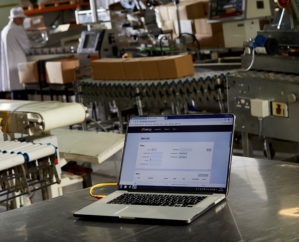-
BLACKOUT TECHNOLOGIES TARGETS TELEMATICS-INTEGRATED MOBILE DEVICE BLOCKING TO COMBAT SMARTPHONE DISTRACTION - April 1, 2025
-
OpenADR Alliance announces first OpenADR 3.0 certified products with EVoke Systems, E.ON Energy and Universal Devices - March 25, 2025
-
Growing fulfilment and contract packer appoints new Managing Director - March 25, 2025
-
When is it time to invest in a WMS? Understanding the key trigger points - March 25, 2025
-
eCapital helps Vantage Recruitment on its journey to financial success - March 24, 2025
-
Hugo Beck Celebrates 70 Years of Packaging Innovation with Open House Events - March 20, 2025
-
PROLOG FULFILMENT SUPPORTS LUNA DAILY’S COMMITMENT TO BETTER BODY CARE FOR ALL WOMEN - March 19, 2025
-
Motion Ventures launches largest-ever maritime tech fund at $100M to meet the industry’s new pace of adoption - March 18, 2025
-
ITD GLOBAL APPOINTS GROUP CHIEF REVENUE OFFICER - March 17, 2025
-
SURECAM TEAMS UP WITH ENTERPRISE FLEX-E-RENT FOR VEHICLE REPAIR & MAINTENANCE CONFERENCE - March 14, 2025
DIGITALISATION IS HELPING CONTRACT PACKERS, MANUFACTURERS AND 3PLs MITIGATE GROWING LABOUR SHORTAGES
Leading provider of agile supply chain solutions, Nulogy, is reporting that digitalisation is increasingly being recognised by global contract packers, manufacturers, and third-party logistics firms (3PLs) as a powerful tool to address the acute labour shortages present within the economy.
With the latest global surge of COVID-19 and post Brexit consequences severely impacting labour capacity, many warehousing, contract packing and manufacturing business leaders are focusing on developing strategic solutions for ongoing labour shortages and digitalisation is helping them to maintain productive operations.
According to the latest report from Logistics UK, COVID-19 and Brexit have created a “perfect storm” of unemployment and skills shortages that are disrupting supply chains across the UK, with job vacancies soaring to 1.25 million in December 2021 according to the Office of National Statistics. This labour crunch is in itself further compounded by what is being dubbed “The Great Resignation”, a phenomenon driven by staff voluntarily leaving their jobs in record numbers.
Clare Bottle, Chief Executive of UKWA, says its members are reporting up to 30 per cent of its workforce are absent due to COVID. When underlying vacancies caused through more general shortages are added to this, businesses are facing a momentous challenge in maintaining service levels, resulting in an increase in cost.
This is why software like Nulogy is helping to safeguard co-pack businesses by digitalising their operational workflows, avoiding overreliance on key individuals who are the only ones who know the job process. With a digital solution, operational knowledge is embedded in the system itself, meaning that if an employee is absent or leaves, the process information and historical knowledge are still retained within the business.
All operational workflows are preserved and, in addition, with one centralised platform, real-time inventory and production monitoring is shared, ensuring that context is less dependent on specific employees who are familiar with production processes.
In the UK, Marsden Packaging, based in Blackburn, specialises in primary and secondary packaging services for the food and pharmaceutical sectors and has been using Nulogy’s software to power its operations for over six years.
“At Marsden Packaging we have been impacted by labour shortages as a direct consequence of COVID-19, and Brexit. Nulogy has been instrumental in helping us overcome these challenges, allowing for standardised processing, wide scale sharing of information, and improving efficiency when we have faced a gap in labour.
“The food sector demands strict policies and procedures, so ensuring we had optimum management systems in place was always a must. Nulogy however, takes this one step further, empowering our operations with a new level of visibility, control, and agility,” said Michael Briggs, MD Marsden Packaging UK.
Josephine Coombe, Managing Director for Nulogy, Europe, said, “It is clear that staff shortages are likely to continue for the foreseeable future, meaning that business leaders need robust strategies for protecting their business from productivity impacts related to labour.
“Digitalisation is an important arrow in that quiver of strategies and as external logistics, contract packing and manufacturing partners and their FMCG customers emerge from the pandemic, we are seeing increasing interest in helping futureproof businesses through utilising this solution.”

































